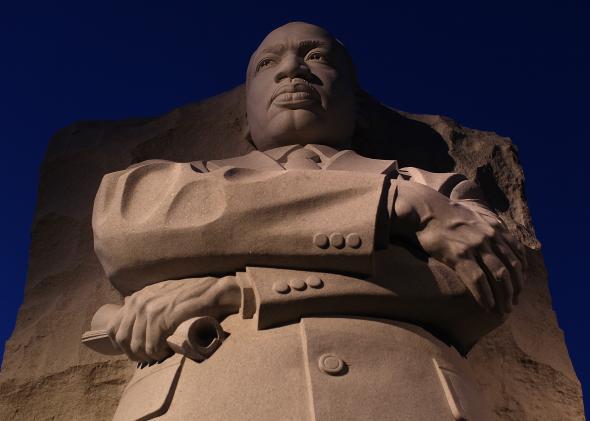For daily picks of new and classic nonfiction, check out Longform or follow @longform on Twitter. Download Longform’s app to read the latest picks and follow any writer or publisher, including Slate.
Letter From Birmingham Jail
Martin Luther King, Jr. • Liberation • May 1963
On the moral responsibility to break unjust laws.
There comes a time when the cup of endurance runs over, and men are no longer willing to be plunged into the abyss of despair. I hope, sirs, you can understand our legitimate and unavoidable impatience. You express a great deal of anxiety over our willingness to break laws. This is certainly a legitimate concern. Since we so diligently urge people to obey the Supreme Court’s decision of 1954 outlawing segregation in the public schools, at first glance it may seem rather paradoxical for us consciously to break laws. One may well ask: “How can you advocate breaking some laws and obeying others?” The answer lies in the fact that there are two types of laws: just and unjust. I would be the first to advocate obeying just laws. One has not only a legal but a moral responsibility to obey just laws. Conversely, one has a moral responsibility to disobey unjust laws. I would agree with St. Augustine that “an unjust law is no law at all.”
An Open Letter to Wikipedia
Philip Roth • The New Yorker • September 2012
An author asks to amend his entry.
I am Philip Roth. I had reason recently to read for the first time the Wikipedia entry discussing my novel “The Human Stain.” The entry contains a serious misstatement that I would like to ask to have removed. This item entered Wikipedia not from the world of truthfulness but from the babble of literary gossip—there is no truth in it at all.
Apologia to My Second Child
John Hodgman • Psychology Today • January 2007
On the wonders of being an only child.
I commandeered one of these rooms for the purpose of my practicing the clarinet and the viola. This pretty much sums up being an only child to me. Only an only child could afford to take up not one but two relatively esoteric supporting instruments. And when I say afford, I speak not only of the actual cost of lessons. A siblinged child enacts his own insecurity when he picks up the guitar, the violin, the piano, those desperate showboat instruments all yearning to solo. But an only child has no need for these sorts of games. Assured of love and sustenance and space and time, the only child is free to cultivate idiosyncrasy.
An Open Letter to My Sister, Miss Angela Davis
James Baldwin • New York Review of Books • January 1971
Davis was imprisoned on charges of first-degree murder.
The American triumph—in which the American tragedy has always been implicit—was to make black people despise themselves. When I was little I despised myself, I did not know any better. And this meant, albeit unconsciously, or against my will, or in great pain, that I also despised my father. And my mother. And my brothers. And my sisters. Black people were killing each other every Saturday night out on Lenox Avenue, when I was growing up; and no one explained to them, or to me, that it was intended that they should; that they were penned where they were, like animals, in order that they should consider themselves no better than animals. Everything supported this sense of reality, nothing denied it: and so one was ready, when it came time to go to work, to be treated as a slave.
Governor Perry, Have Mercy on This Man
Michael Hall • Texas Monthly • October 2014
Max Soffar, who has liver cancer, has been on death row since 1981. He’s almost certainly innocent.
At some point soon—it could be tomorrow, it could be in two months—Max will begin to deteriorate. According to doctors, he’ll feel severe abdominal pain, he’ll begin to bleed, and he’ll start to lose his mental capacities. He’ll leave death row, his home for 33 years, and make one last trip to Sealy Hospital, in Galveston. Once he arrives, he won’t be allowed any visitors at all, outside of Horne and his associates. As Max lies dying, Anita won’t be able to visit him, nor will his sister Jackie or her children. In other words, Max will die surrounded by lawyers.
J’accuse
Émile Zola • L’Aurore • January 1898
On the imprisonment of Alfred Dreyfus.
How flimsy it is! The fact that someone could have been convicted on this charge is the ultimate iniquity. I defy decent men to read it without a stir of indignation in their hearts and a cry of revulsion, at the thought of the undeserved punishment being meted out there on Devil’s Island. He knew several languages: a crime! He carried no compromising papers: a crime! He would occasionally visit his country of origin: a crime! He was hard-working, and strove to be well informed: a crime! He did not become confused: a crime! He became confused: a crime!
Have a favorite piece that we missed? Leave the link in the comments or tweet it to @longform. For more great writing, check out Longform’s complete archive.
